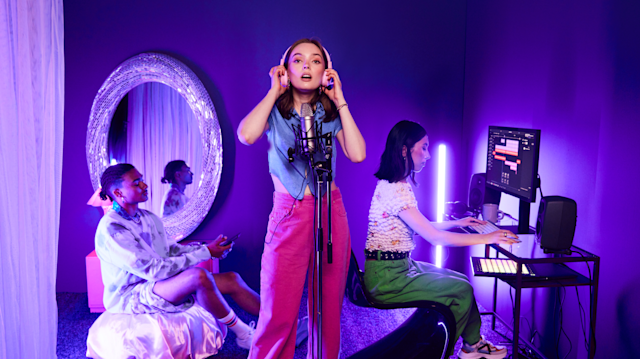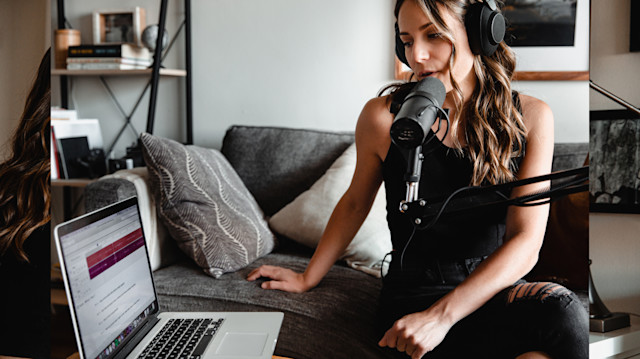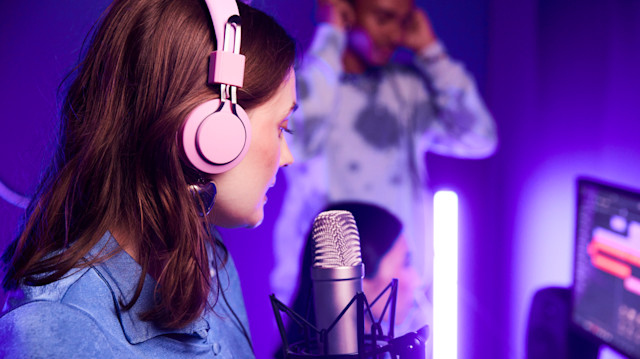How To Start a Music Career - Top Tips from a Music Pro
August 9, 2024 - Break into the music industry! Learn essential tips from a pro on starting your music career. Discover the path to success.

This article will include a fair bit of storytelling, as I share the tips and tricks I learned along the way. Here’s a bit about me: I am a professional musician/private teacher/woodwind session artist and music-niche writer/freelancer. I am a person who went down the traditional classical/college music pipeline.
I went to school for my bachelor's in instrumental music education and (expected) to become a full-time teacher in US public schools. However, I quickly learned that this didn’t fulfill or fuel me in the way I thought it would. And, as it turns out, making a B-line in your music career teaches you a lot about yourself and the industry! I am now a remote session musician, producer, music/press release writer, and music critic.
So, if you’re looking to start a music career, you’ve come to the right blog! Here’s what I’ve learned about the steps you need to take and the roadblocks you’ll likely run into along the way when becoming a music pro.
First things first: becoming knowledgeable about music.
Step 1: Become Educated in Music
Ask yourself: Do you need a music degree?
Be sure to: Practice (practice, practice) and take private lessons if you can
Do: Learn music theory (even if you think you don’t need to!)
Ask as much as you can: Listen to music made by industry pros with intention
Decide What You Need
Getting an education in music- This can mean a lot of different things: If you want to be a vocalist, make sure your voice is strong (obviously!). Want to be a guitarist? Push yourself and work on memorizing the fretboard, and learning to read sheet music on your instrument.
Take private lessons with a musician who you look up to and want to sound like. While they might be expensive per hour, they will be experiences you’ll keep for a lifetime.
Even if you think you don’t need them, be sure to cover all the basics, learn what harmonies are and how they work, pen a song, and so on. Then, become as well-versed in your specific niche as you can until you have become confident. But be warned, this may take a long time!
If you want to be a producer, intentional music listening sessions paired with interning at a music studio may be more valuable than a college degree.
This is by no means to discount music degrees- mine serves me well every day. If you want a 2 or 4-year fast-tracked guide to everything music… from basic theory to identifying the Tristan chord to learning to recognize eras of music and study every main category of instrument…then a music degree is a wonderful asset to have.
Record Yourself & Self Reflect
If you decide to do it all yourself from home, take the time to record and reflect. Many artists make the mistake of putting themselves out there too soon and end up with a subpar product. When I first started producing music, I’ll be the first to admit: It was pretty rough. I made a music video for a song with poorly mixed vocals, and of course, it didn’t go anywhere at all. It took me several years, vocal lessons, and many equipment upgrades to get my sound quality up to par with what I imagined inside of my head.
Once you have a clear picture of what you want to do in music and get some experience under your belt, it’s time for step two.

Step 2: Put Yourself Out There
Cold email, do your research
Perform live
Collaborate remotely
Make social media accounts
Be consistent
You wouldn’t believe how far networking and cold emailing will get you in the music industry. There’s a lot to learn in this stage, too. There’s the question of how to get on Spotify playlists and be seen. Putting yourself out there feels like flat advice, but the key to all of this is consistency- in practice, in social media, and self-promotions, everything.
Another easy way to explore music while gaining experience and boosting your career is to collaborate with people. For example, I recently downloaded Vampr, which is like a Tinder-style social media app, except for music collaborations. Once you meet like-minded artists, you can work together on projects in cloud-based DAWs like Soundtrap.
Don’t Wait Too Terribly Long
Fight imposter syndrome actively
Try the 100 Days of Practice Challenge
I’ll play the devil's advocate and negate what I just said a moment ago. It’s not good to wait too long. This is because being uncomfortable and performing is an essential part of being a musician. So how long is too long?
A good metric to shoot for is to have your performance at least 95% of the way there before you consider getting on a local, low-stakes-type stage.
While it’s a good idea to get as much practice and experience as possible before revving up your career, double-check and make sure it’s not imposter syndrome that’s getting in the way of putting out releases or getting under the lights. I recently had a conversation with professional pit musicians at the historic Croswell Theatre. As it turns out, hesitancy and impostorism prevent music pros from releasing music, too.
Lastly, remember that people on the internet like to see real people, not perfect people. If you need content for a new post or reel, it’s ok to post a practice session and be open about the thing(s) you’re working on.
With A Music Career, Expect the Unexpected
I went to college for instrumental music education with a focus on classical flute with a side of piano. I had expected to end up playing in a symphony or a full-time teaching gig in public schools. After all, that’s what I was the most qualified for. Fast-forward five years and I’m currently a freelance session artist and music theory and music history niche expert.
In the words of my cello professor…
“You go into the industry and you never know what you’ll actually be doing. Your job will be to fit those holes and fill in where you’re needed. We have classical flutists leading mariachi bands after they move to Texas or making tracks for rappers online….Your job is to be as prepared for what’s next. Whatever that may be. ”
Even if you end up in a career adjacent to the one you want, it’s still far better than say- being an accountant who dreams of shredding on the stage. For example, working for a studio may get you discounted hourly rates, or help you promote yourself.
Dive into music in any way that you possibly can, and hone it all in later. It’s like whittling down a pencil until it’s sharp. But first, you have to make sure you have a pencil and not a pen.

Exploring Options
As you grow in your music career, continue to explore. Musicians change and get nudged around all of the time. After all, Panic at the Disco was once a Blink 182 cover band (Pet Salamander)…Just keep going until it feels right inside of yourself.
Know that once you know how to read sheet music and play on instrument, adding or switching to another becomes much easier. The musical knowledge you initially gain can be applied to nearly any music career.
If you go to college for music, you’ll learn that higher ed often has a way of pushing you down one particular path- but you don’t always need to follow it. Once you get into music, you can branch out into a plethora of fields.
If you’re having trouble breaking into the industry, consider music careers that aren’t as well known. You can also pair music with your other skills, like writing or psychology. Here are some ideas, to name a few:
Public relations assistant for a music press company
Songwriter for artists
Music therapist
Instrumental repair mechanic
Freelance session artist
Sometimes, artists are good composers, but not good singers. Enter: Songwriting careers.
Artists like Brittany Spears, Beyonce, and Miley Cyrus often have musicians write songs for them. These songs are sent out, and the artist decides if they like them or not. (That’s why we end up with demos from one artist being released and becoming a top-40 hit from the other.) In fact, lead singer of the band MAGIC! Nasri Atweh was actually a professional songwriter before he started his band. He wrote for Justin Beiber (“Never Say Never”, “As Long As You Love Me” ), Chris Brown, Fifth Harmony, and The Wanted.
If you love being a performer but also feel inclined to help heal people, getting a music therapy license and playing music full-time is a perfect fit.
Other times, a combination of part-time music careers can make up the whole of your work for a time. Doing this will also help you produce a solid and versatile resume.
Always Have a Backup Plan (But Never Give Up on Music)
In 2020, I realized that my music was not enough to financially support me. My music career was bringing in income, but not enough to pay all of the bills. I realized that I would need to find a job that would support me, and allow me to grow music music career while I worked on everything. The problem is, that most fast-food industry jobs and office jobs don’t allow for much flexibility. So what do you do with that dose of realism?
I can’t fully answer this question for you, but for me, the solution was to find a stable flexible job. I decided to run a handmade fantasy crafts shop from home. Since all I needed to do was make products and send them out, my schedule was entirely at my own disclosure. This gig was enough to keep my basic bills paid and allowed me the freedom and time to invest in myself until my career was self-sufficient.
Diving Right In Just Might Pay Off
Some musicians jump right in and decide to go full-pro out of the gate. And sometimes, it works! In my town (Toledo) Chloe and the Steel Strings are living proof of musicians who suddenly decided to make a living with music- and pulled it off with flying colors.
My Parting Advice: Lean into Yourself
On a completely other note, have you noticed how everybody has been talking about Chappell Roan lately? Ever since she dyed her hair vivid red, she has taken off in the charts. But why?!
Making bold fashion statements that call to you and make you feel more like ‘you’ is just one example of leaning into yourself. It may sound canned or cheezy, but being the most authentic version of you will up your confidence (which people can sense) and spill over (in a good way) into your music.
Do you like a niche genre like the fiery Brazilian Phonk? Consider making the music you like to listen to.
This tip of being true to yourself is especially important for those getting into performance and production. In a way, with a music career, it’s all about branding: Except you are the product you’re selling. The more ‘yourself’ you look and feel, the more success you’ll inherently find.
How to Start a Music Career: Conclusion
From getting schooled in music to finding a suitable niche and putting yourself out there, it can all be very overwhelming. The artistic path you take may change and wind but with a music career…If you ask me? It’s always worth shooting your shot.
Want to get started making a career out of your music?
Soundtrap is an excellent place to start tracking tunes. We’re a fully-cloud-based digital audio workstation (DAW) that allows you to make beats, collaborate on music, find loops, and edit your work. Click this link to try it out for free.
About the author
Aleah Fitzwater is a multi-instrumentalist, songwriter, music journalist, and blogger from Temperance, United States. Aleah holds a Pk-12 instrumental music education degree. Her main instruments are flute, piano, drums, bass, and guitar.
Kom igång med Soundtrap idag!